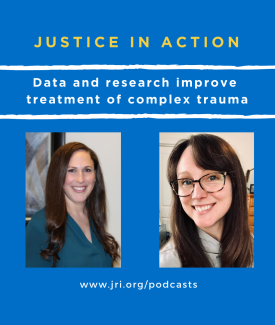Do you have a question about JRI services?
Few social service agencies are as committed as JRI to improving treatment through research and data.
In today’s episode of Justice in Action, we talk to Hilary Hodgdon, Research Director at Justice Resource Institute, and Lia Martin, Senior Associate Director of Quality Management. Together, they are part of a data and research division that is unusual among social service agencies for its size and scope.
JRI clients suffer from complex trauma. On average, a child or adolescent seeing a JRI therapist has experienced three different types of trauma, such as neglect, physical abuse or psychological abuse. That number rises to five or six for clients in residential programs. In addition, these young people may face racism or other types of bias These traumas can affect children’s attachment to their parents or other caregiver, as well as how they think of themselves in the world and whether they see the world as a safe or dangerous place.
The data that Hilary and Lia gather and analyze help guide, assess and improve treatments for these young victims of complex trauma. JRI also uses the data to evaluate the effectiveness of its programs.
The heart of the data and research work is the Client Assessment Tracking System, or CATS, a tool developed by JRI to gather and analyze information about clients and families. Hilary and Lia use the data not only to support the work of JRI clinicians and programs, but also to examine specific research questions, such as how gender, race and an individual’s personal history with trauma affect treatment outcomes. They learned, for instance, that while females tend to present with more and stronger symptoms than males, both genders benefit equally from trauma-informed care.
Smaller agencies that lack a complete research department of their own also benefit from JRI’s research program. Clinicians from those agencies can feed their clients’ data into CATS and benefit from the analysis in the treatment of their clients. In addition, Hilary and Lia are having a nationwide impact on trauma-informed care through training, presentations and the peer-reviewed articles they write and publish.
For more information on JRI’s data and research work, visit our Research and Publications page and our Client Assessment Tracking System (CATS)




